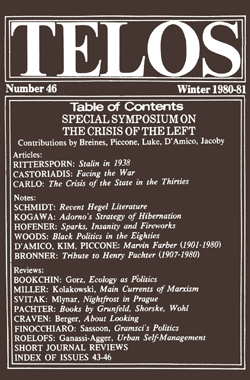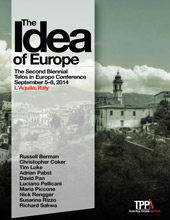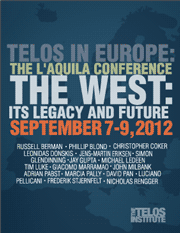By Sean McMorrow · Tuesday, October 13, 2015  “Facing the War” is a translation from the first section of Devant la guerre, Cornelius Castoriadis’s least regarded work within English-speaking circles. The reason for this marginalization is its central claim that Russian society had transformed into a stratocratic regime, with increased probability for an escalation into a Third World War. Castoriadis’s critics claimed he had missed signs of perestroika and glasnost already on the horizon. Viewed from this perspective, history could not have been more cruel to Castoriadis. However, the value of his work does not depend on a predictive mode of political analysis, a point that is clearly prefaced in this work: calls for predictive accuracy ignore the radical character of historical contingency. In fact, the unexpected events put into motion later by Gorbachev only strengthen Castoriadis’s perspective in the sense that such a development represents the deeper problem of historical indeterminacy, and it is in this respect that his analysis is finely tuned to any society’s condition of historical contingency. “Facing the War” is a translation from the first section of Devant la guerre, Cornelius Castoriadis’s least regarded work within English-speaking circles. The reason for this marginalization is its central claim that Russian society had transformed into a stratocratic regime, with increased probability for an escalation into a Third World War. Castoriadis’s critics claimed he had missed signs of perestroika and glasnost already on the horizon. Viewed from this perspective, history could not have been more cruel to Castoriadis. However, the value of his work does not depend on a predictive mode of political analysis, a point that is clearly prefaced in this work: calls for predictive accuracy ignore the radical character of historical contingency. In fact, the unexpected events put into motion later by Gorbachev only strengthen Castoriadis’s perspective in the sense that such a development represents the deeper problem of historical indeterminacy, and it is in this respect that his analysis is finely tuned to any society’s condition of historical contingency.
Castoriadis’s analysis here is an updated version of the assessment of Russian society that had been developed within Socialisme ou Barbarie. Castoriadis makes a compelling argument that Russia had regenerated itself into a full-blown stratocracy, armed to the teeth and yet still unable to provide its citizens with a functional civic bureaucracy; a decade later he reflects that a core argument of “Facing the War” was that brute force had become the sole signification holding this society together. Castoriadis’s argument operates at two levels: as a political analysis of Russian bureaucratic spheres (the comparison of military capacity between superpowers and a critique of rational determinism within the justification of Cold War strategy—i.e., M.A.D.); and as a political judgement of the imaginary significations that served to orient Russian society. It is through the latter level that lessons on historical contingency are astutely relevant to the contemporary world situation.
Continue reading →
By Telos Press · Monday, December 8, 2014 On The Agenda with Steve Paikin, Michael Millerman discusses the philosophy of Alexander Dugin and its influence on Vladimir Putin and contemporary Russian geopolitics. It’s a wide-ranging interview that covers Dugin’s theory of Eurasianism, his critique of the West and liberal democracy, the defense of Russia as a unique, non-Western civilization in its own right, the compatibility of Dugin’s anti-communism with the view that the collapse of the Soviet Union was a geopolitical catastrophe, the difference between Western multiculturalism and the kind of multicivilizational diversity that Dugin advocates, and much more. Watch the full interview below. In addition to co-translating Dugin’s The Fourth Political Theory (Arktos, 2012), Michael is also a former Telos intern. You can read more of his writing in the TELOSscope archives.
Continue reading →
By Richard Sakwa · Monday, September 15, 2014 The following paper was presented at the recent Telos in Europe conference on “The Idea of Europe,” held in L’Aquila, Italy, on September 5–8, 2014.
 The Ukraine crisis reflected the continuation in new forms of what used to be called the East-West conflict. After the end of the Cold War in 1989–91, as a result of Mikhail Gorbachev’s attempt to reform the Soviet Union based on the ideas of the “new political thinking,” no inclusive and equitable peace system was established. Instead, an asymmetrical peace was imposed on Russia. The Soviet Union disintegrated in December 1991, and Russia emerged as the “continuer state,” assuming the burdens, treaty obligations, and nuclear responsibilities of the former USSR. As far as Russia was concerned, the end of the Cold War had been a shared victory: everyone stood to gain from the end of the division of Europe, symbolized by the fall of the Berlin Wall in November 1989. The institutions of the Cold War in the East were dismantled, above all the Warsaw Treaty Organization (the Warsaw Pact), but on the other side the organizations of the Cold War were extended, above all in the form of the North Atlantic Treaty Organization (NATO). The Ukraine crisis reflected the continuation in new forms of what used to be called the East-West conflict. After the end of the Cold War in 1989–91, as a result of Mikhail Gorbachev’s attempt to reform the Soviet Union based on the ideas of the “new political thinking,” no inclusive and equitable peace system was established. Instead, an asymmetrical peace was imposed on Russia. The Soviet Union disintegrated in December 1991, and Russia emerged as the “continuer state,” assuming the burdens, treaty obligations, and nuclear responsibilities of the former USSR. As far as Russia was concerned, the end of the Cold War had been a shared victory: everyone stood to gain from the end of the division of Europe, symbolized by the fall of the Berlin Wall in November 1989. The institutions of the Cold War in the East were dismantled, above all the Warsaw Treaty Organization (the Warsaw Pact), but on the other side the organizations of the Cold War were extended, above all in the form of the North Atlantic Treaty Organization (NATO).
Continue reading →
By Adrian Pabst · Thursday, September 11, 2014 The following paper was presented at the recent Telos in Europe conference on “The Idea of Europe,” held in L’Aquila, Italy, on September 5–8, 2014.
 The continual crisis in Ukraine is perpetuating an East-West schism that was never overcome after the end of the Cold War. Even if there is no all-out war between the major powers involved in the Ukrainian conflict, Europe faces the distinct prospect of a permanent divide at its very heart. The EU increasingly looks like an annex to the United States, which oscillates between isolationism and interventionism. Meanwhile Russia is fast becoming a vassal state that supplies cheap resources to China. After more than 500 years at the center of international affairs, the whole of Europe is bereft of ideas and incapable of acting as a force for good. The continual crisis in Ukraine is perpetuating an East-West schism that was never overcome after the end of the Cold War. Even if there is no all-out war between the major powers involved in the Ukrainian conflict, Europe faces the distinct prospect of a permanent divide at its very heart. The EU increasingly looks like an annex to the United States, which oscillates between isolationism and interventionism. Meanwhile Russia is fast becoming a vassal state that supplies cheap resources to China. After more than 500 years at the center of international affairs, the whole of Europe is bereft of ideas and incapable of acting as a force for good.
Continue reading →
By Artemy Magun · Tuesday, March 11, 2014 The ongoing take over of Crimea by Russia, and its intense political campaigning to annul the results of the Kiev revolution, took most observers of international politics by surprise. Normally, one has not been considering Russia as a serious contender of the United States for hegemony, as a country with serious economic or military resources, or even as a country with a particularly serious ideology. American and European political science has for decades been busy with “transitions to democracy” and the evaluation of their relative successes (even though there is a recent shift toward the study of authoritarianism), and in International Relations, China seemed to be the only possible opponent to U.S. unilateral hegemony. European Studies examines the various neighborhood policies of the European Union, measuring their relative success in “democratization.” The U.S. and European leaders therefore reacted to the events in Russia and Ukraine with surprise: John Kerry spoke of Russia’s “nineteenth-century behavior,” and Angela Merkel described Putin as being delusional, living “in another world.” This correctly describes the huge discrepancies in worldviews and values, but the views and values of Russian leadership, whether delusional or not, have very real effects, and therefore represent a repressed part of the reality about which the Western leaders do not want to think.
Continue reading →
By Alessandro Vitale · Friday, January 25, 2013 The following paper was presented at Telos in Europe: The L’Aquila Conference, held on September 7-9, 2012, in L’Aquila, Italy.
 “Russia and the West” is a topic that never seems to be exhausted, and as a question, one that can never be answered satisfactorily. People and intellectuals use a staggering number of criteria to determine Russia’s suitability (or lack thereof) to be counted “Western,” ranging from the geographic and the linguistic to the political and institutional. For centuries, Russians have wondered if they are part of “Europe.” It is evident that geographically and culturally they are “Eurasians.” In any case, about three-quarters of the Russian population live west of the Urals, in what has always been considered a part of Europe. Russia has been connected to Europe for centuries. All the important movements, relevant things that Russia has made in history, have been through its connection to Europe. Russia has really been and remains an important part of Europe. But Russia is not only Europe. “Russia and the West” is a topic that never seems to be exhausted, and as a question, one that can never be answered satisfactorily. People and intellectuals use a staggering number of criteria to determine Russia’s suitability (or lack thereof) to be counted “Western,” ranging from the geographic and the linguistic to the political and institutional. For centuries, Russians have wondered if they are part of “Europe.” It is evident that geographically and culturally they are “Eurasians.” In any case, about three-quarters of the Russian population live west of the Urals, in what has always been considered a part of Europe. Russia has been connected to Europe for centuries. All the important movements, relevant things that Russia has made in history, have been through its connection to Europe. Russia has really been and remains an important part of Europe. But Russia is not only Europe.
Continue reading →
|
|
 “Facing the War” is a translation from the first section of Devant la guerre, Cornelius Castoriadis’s least regarded work within English-speaking circles. The reason for this marginalization is its central claim that Russian society had transformed into a stratocratic regime, with increased probability for an escalation into a Third World War. Castoriadis’s critics claimed he had missed signs of perestroika and glasnost already on the horizon. Viewed from this perspective, history could not have been more cruel to Castoriadis. However, the value of his work does not depend on a predictive mode of political analysis, a point that is clearly prefaced in this work: calls for predictive accuracy ignore the radical character of historical contingency. In fact, the unexpected events put into motion later by Gorbachev only strengthen Castoriadis’s perspective in the sense that such a development represents the deeper problem of historical indeterminacy, and it is in this respect that his analysis is finely tuned to any society’s condition of historical contingency.
“Facing the War” is a translation from the first section of Devant la guerre, Cornelius Castoriadis’s least regarded work within English-speaking circles. The reason for this marginalization is its central claim that Russian society had transformed into a stratocratic regime, with increased probability for an escalation into a Third World War. Castoriadis’s critics claimed he had missed signs of perestroika and glasnost already on the horizon. Viewed from this perspective, history could not have been more cruel to Castoriadis. However, the value of his work does not depend on a predictive mode of political analysis, a point that is clearly prefaced in this work: calls for predictive accuracy ignore the radical character of historical contingency. In fact, the unexpected events put into motion later by Gorbachev only strengthen Castoriadis’s perspective in the sense that such a development represents the deeper problem of historical indeterminacy, and it is in this respect that his analysis is finely tuned to any society’s condition of historical contingency.  The Ukraine crisis reflected the continuation in new forms of what used to be called the East-West conflict. After the end of the Cold War in 1989–91, as a result of Mikhail Gorbachev’s attempt to reform the Soviet Union based on the ideas of the “new political thinking,” no inclusive and equitable peace system was established. Instead, an asymmetrical peace was imposed on Russia. The Soviet Union disintegrated in December 1991, and Russia emerged as the “continuer state,” assuming the burdens, treaty obligations, and nuclear responsibilities of the former USSR. As far as Russia was concerned, the end of the Cold War had been a shared victory: everyone stood to gain from the end of the division of Europe, symbolized by the fall of the Berlin Wall in November 1989. The institutions of the Cold War in the East were dismantled, above all the Warsaw Treaty Organization (the Warsaw Pact), but on the other side the organizations of the Cold War were extended, above all in the form of the North Atlantic Treaty Organization (NATO).
The Ukraine crisis reflected the continuation in new forms of what used to be called the East-West conflict. After the end of the Cold War in 1989–91, as a result of Mikhail Gorbachev’s attempt to reform the Soviet Union based on the ideas of the “new political thinking,” no inclusive and equitable peace system was established. Instead, an asymmetrical peace was imposed on Russia. The Soviet Union disintegrated in December 1991, and Russia emerged as the “continuer state,” assuming the burdens, treaty obligations, and nuclear responsibilities of the former USSR. As far as Russia was concerned, the end of the Cold War had been a shared victory: everyone stood to gain from the end of the division of Europe, symbolized by the fall of the Berlin Wall in November 1989. The institutions of the Cold War in the East were dismantled, above all the Warsaw Treaty Organization (the Warsaw Pact), but on the other side the organizations of the Cold War were extended, above all in the form of the North Atlantic Treaty Organization (NATO).  “Russia and the West” is a topic that never seems to be exhausted, and as a question, one that can never be answered satisfactorily. People and intellectuals use a staggering number of criteria to determine Russia’s suitability (or lack thereof) to be counted “Western,” ranging from the geographic and the linguistic to the political and institutional. For centuries, Russians have wondered if they are part of “Europe.” It is evident that geographically and culturally they are “Eurasians.” In any case, about three-quarters of the Russian population live west of the Urals, in what has always been considered a part of Europe. Russia has been connected to Europe for centuries. All the important movements, relevant things that Russia has made in history, have been through its connection to Europe. Russia has really been and remains an important part of Europe. But Russia is not only Europe.
“Russia and the West” is a topic that never seems to be exhausted, and as a question, one that can never be answered satisfactorily. People and intellectuals use a staggering number of criteria to determine Russia’s suitability (or lack thereof) to be counted “Western,” ranging from the geographic and the linguistic to the political and institutional. For centuries, Russians have wondered if they are part of “Europe.” It is evident that geographically and culturally they are “Eurasians.” In any case, about three-quarters of the Russian population live west of the Urals, in what has always been considered a part of Europe. Russia has been connected to Europe for centuries. All the important movements, relevant things that Russia has made in history, have been through its connection to Europe. Russia has really been and remains an important part of Europe. But Russia is not only Europe. 

